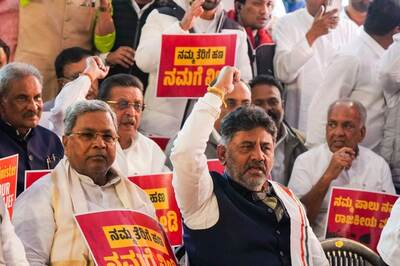
views
Gay, immigrant, author, and LGBTQ+ activist from a Muslim background, who has renounced his faith — Nemat Sadat does not take any of these identities lightly. Sadat, known as the first citizen of Afghanistan to publically come out as gay (in 2013), had to give up a lot to claim them.
Soon after he came out to the world, he was abandoned by his family, friends, and community members, and he ended up living in a shelter for the homeless.
He has received thousands of death threats from Mullahs for “subverting Islam”. Due to the raging political turmoil, his mother had secretly brought him to the United States when he was a baby.
As an author, his first novel was rejected more than 450 times, and as an activist, he was driven out of Afghanistan for organising an underground LGBTQ+ movement and threatened with persecution.
Today, however, things are different. Sadat is currently the toast of every literary festival in India. Last month, he was at the TATA literature festival in Mumbai, and this month, he was a speaker at the Rainbow Literature Festival in Delhi, as well as Times Literature Festival in Kolkata.
His debut novel, 'The Carpet Weaver', has not only earned him critical acclaim but also gave him a strong fan-base in India. However, this literary success did not come easily to him. Sadat told News18 he had received about 450 rejections from literary agents in the United States, and the UK before Penguin Random House India decided to go ahead with it.
There were several other rejections from editors of publishing houses too, he recalled. "I can almost break all records in human history when it comes to facing rejections,” said Sadat.
Although the common reason for rejecting ‘The Carpet Weaver’ that was given by agents and publishers was either the lack of market potential or literary merit, Sadat suspects it had to do with racism as well.
“I believe Kanishka's character (the protagonist) in ‘The Carpet Weaver’ is empowering too many people. He represents the Muslim community, the immigrants, the LGBTQ community — all the groups that the Whites, the native-born heterosexual people want to subjugate. They still feel that they should dominate the narrative, even if that is outdated and inflexible, and they have already been told a million times that nobody wants to hear it,” said Sadat.
“The lead character shows how terrorist groups in Afghanistan were funded by the United States. The book also overturns the idea of the 'American dream' by showing the hollowness of it,” he added.
Sadat said he sensed that behind all the rejection that came his way, was also the fear that if stories like his started doing well, and more authors from minority communities began telling their tales inspired by his success, it would threaten the White supremacy narrative.
However, Sadat is someone who can sift out a silver lining from the blackest night. Instead of getting deterred by rejections, he called them “blessing in disguise”.
"There was a silver lining in all those rejections. Had the version that I had started pitching in 2015 gone out, I don't think the book would have been as good as it is now," he said, adding, “Most people gave very minimal or no feedback. Several wrote back saying, 'not for me' which was rather disheartening. But some people did give feedback, and I incorporated those that I found useful. I rewrote the novel. Took more writing classes. Worked with a freelance editor. It actually helped in honing my skills. So, all those rejections had been a blessing in disguise.”
Sadat had lived in two extreme worlds. One is Afghanistan, where homosexuality is criminal not just by law, but also considered a taboo in society. And the other is the United States, a first-world country, which propounds liberal ideologies, and where LGBTQ+ community members have legal rights. However, homophobia exists in both these worlds, albeit, in different forms, said the author.
"In the United States, violence against the transgender community is a daily occurrence. You have a government right now that is deliberately going against transgender people. But, it isn't just the political system, it is also the US society at large. There is discrimination even within the LGBTQ community. If you are a gay white man, you have entered the country club, and old boys networks, and you are fine. If you are affluent, educated, you are not considered a minority anymore." said Sadat.
"But, if you are a gay man of colour — a Latino, black, middle-eastern or from a Muslim background — you are not welcome in these communities. I live in Washington, and I am not accepted in these gay white men communities. These are men who supported Hillary Clinton and call themselves liberal. They want civil rights, and they say 'black lives matter'. But, in their groups of sexual partners, marital partners, parties, friends and business associates, they don't want us. It is very hypocritical. It is very racist. In the US, there is more racism in the LGBTQ+ community than in the general population. You’ll find more inter-racial, inter-ethnic couples among the general population,” he added.
On the other hand, in Afghanistan, the LGBTQ+ movement is still in a nascent stage. In 2012, Sadat was an assistant professor of political science, in the American University in Afghanistan, and often commented on the war in Afghanistan, and US foreign policies on TV channels.
He was also instrumental in organising an underground LGBTQ+ movement, during his stay there. But, it did cost him his academic career, and his right to stay in his country of birth.
"Students who were cheating and plagiarising found ways to spread rumours about me, off-campus, to the higher levels of Parliament, because they had connections. They also knew who I was because I was a political commentator on TV. They said I am a lapsed Muslim who is also a homosexual. They said I was an infidel. They also initially claimed that I was a devil worshipper, and many other such false allegations but that didn't really take a pull. So, they went after the real stuff. They really do love a conspiracy,” he said with a laugh.
The writer, however, did not retreat for the fear of persecution. Instead, he continued to mobilise the LGBTQ+ underground movement that brought him in contact with several other members of the community who were trying in their own ways to spread awareness about LGBTQ rights in the country.
"I would promote on social media about LGBTQ rights, and people would reach out to me. We would often meet up at coffee shops secretively. Some of the people I had met during this period had connections in Afghani radio stations on which they quietly promoted pro-LGBTQ content. I met people who were working in NGOs creating HIV/Aids awareness and talking about LGBTQ rights in that guise. Even some organisations which worked on gender and women's rights would sneak in conversations about LGBTQ+. This is kind of how the LGBTQ+ movement started,” he said.
However, propaganda against Sadat soon caught up and the American University urged him not to return to Afghanistan. “The government had basically pressured the university and told them that if I returned to Afghanistan, they would criminalise me for my homosexuality. They just sent me a letter saying I was fired," he said.
This ordeal in Afghanistan only made Sadat more resolute and he finally decided to come out to the world from his New York Apartment on August 22, 2013. It was a simple, fun post, but the reactions it received was far from how coming-out stories pan out these days in the United States.
"In the West, the coming-out narrative is that it is a feel-good moment. All the videos you see on YouTube are those in which the families hug them, and they break into tears," said Sadat.
"For me, it was different. I just ended the conflict in my head, but after that post, many relatives and many people in my community just disowned me. I received thousands of death threats and curses, and fatwas from the mullahs of Afghanistan." he added.
These were perhaps some of the most trying times in Sadat's life. Despite having several degrees, and work experience as an academician as well as a journalist, he could never go back to doing those jobs again. In fact, he couldn't do any job to support himself.
"Basically, I couldn't find a job, because I had become too controversial," he said. His father refused to support him during this phase, and the author claimed that he ended up living in a homeless’ shelter.
Most people silently suffer under the burden of all the lives that they don't get to live, but Sadat isn't one of them. Instead of wallowing in his misfortunes, he started writing ‘The Carpet Weaver’.
It became one of the first books on homosexuality to hit the Indian market after Section 377 was struck down by the Supreme Court. Sadat said one of the reasons he thinks the book worked was because it did not endorse the “self-loathing gay narrative”.
"I didn't want to write a story about that. Yes, there are moments in my character's life, when he questions things, but he is never bashing his sexuality. I think people are tired of the self-loathing gay narrative. I think that is why people were so excited about this book because it was the first story that was very unapologetic not only with sexuality but also with religion."
Sadat, who doesn't identify himself as Muslim anymore said religion is just an instrument to regulate people's sexuality.
"If you can control people's bodies, you can control their minds. If you can control their minds, you can control them as a subject, so that is kind of where it comes from. I think people in power (be it religious or political) are mostly scared of sexually liberated people because such individuals are fearless,” he added.



















Comments
0 comment